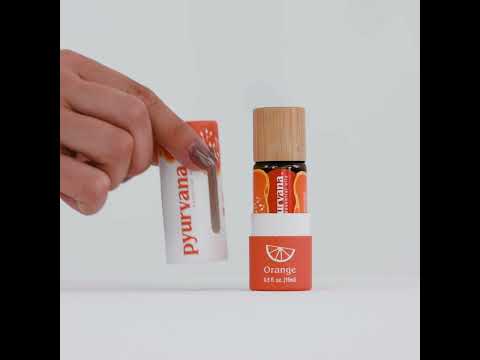Orange Oil – 15ml
Orange Oil – 15ml
Couldn't load pickup availability

Orange oil has a bright, sweet scent that is immediately recognizable. Diffusing this essential oil can help elevate your mood and energize you.
More Information


What is Orange Oil?
Like most citrus fruits, citrus sinensis is a hybrid. It is a cross between pomelo (Citrus maxima) and mandarin (Citrus reticulata). Citrus sinensis is also called sweet orange, which is to help distinguish it from Citrus aurantium, or bitter orange. There are a few different varieties of sweet orange, although they are all fairly similar in taste, scent, and appearance. The main differences are where and during what times of year they grow.
The first mention of sweet oranges was in 314 BC in Chinese literature. The name comes from the Sanskrit naranga, which referred to the orange tree. The first use of “orange” in English to refer to the fruit was in the 1300s and the first use of the word “orange” to describe the color was in 1512. This means that the color is named after the fruit and not the other way around. Oranges were a luxury item throughout much of history and one of the largest orangeries was at the Palace of Versailles under Louis XIV.
To extract our orange essential oil, we use cold pressing. This avoids exposure to heat, which preserves the aroma. This process involves mechanically pressing Citrus sinensis peels. We then use centrifugation and a variety of other purification methods to separate the essential oil from the water.
Complementary Scents
Combining citrus oils allows you to create vibrant, refreshing scents. Our sweet orange essential oil pairs well with lemon, lime, bergamot, and grapefruit. This oil also smells wonderful when combined with spicy scents such as cinnamon, clove, and frankincense. You can also blend it with lavender or juniper berry.
Primary Benefits
One of the major benefits of orange essential oil is its bright, uplifting scent. It is a popular choice for aromatherapy because it can easily boost your mood and help you create a positive space. You can do this by adding the oil to your diffuser or making a room spray. For an added effect, try combining orange with other energizing oils such as bergamot, cinnamon, or grapefruit.
Orange oil is a great choice to use for a massage as it is naturally warming and relaxing. Combining it with spicy scents like cinnamon can enhance this effect. To make a massage oil, combine three drops of essential oil with one teaspoon or your preferred carrier oil.
This essential oil can also brighten your complexion and cleanse your skin. You can add our orange oil to an unscented moisturizer or dilute it with a carrier oil, then apply it topically. For any facial application, you should use a lower concentration. We recommend three drops of orange oil in four teaspoons of carrier oil.
How to Use Orange Essential Oil
To diffuse orange essential oil, add a few drops to your diffuser of choice. Make sure to follow any specific instructions for your model and do not add more than a few drops. Using too much essential oil or diffusing for longer than a few hours at a time can lead to overexposure and may damage your diffuser.
To apply this oil to your skin, you must dilute it with a carrier oil first. We suggest coconut oil, jojoba oil, or olive oil, although there are many options you can choose from depending on your personal preference. We recommend using three drops of oil in one teaspoon of a carrier oil, although you may wish to start with a lower concentration if you have sensitive skin. Always test on a small area first before using the oil more widely.
Cautions
Orange oil, like other citrus oils, can cause photosensitivity. This means that you are more likely to experience sunburns if you are exposed to ultraviolet (UV) rays. You should avoid sun exposure for up to 12 hours after applying this oil topically. If you do go outside, use sunscreen, wear long sleeves, and stay in the shade when possible.
Any 100% pure essential oil, including orange oil, must be diluted with a carrier oil before being applied topically. You should also avoid applying near sensitive areas such as your nose, ears, or eyes. Some people are more sensitive to essential oils than others or are allergic to specific compounds. If you notice any adverse reaction when using orange oil, stop use immediately and seek medical attention.
Keep out of reach of children.
If you are pregnant, nursing, or under the care of a physician, consult your health care provider before using orange or any other essential oil.
This essential oil is for external use only and should not be ingested.
Pure essential oils are flammable and should be stored in a cool, dry location away from any open flames or excess heat.
What's Trending
-
 50%
50%
OFFBergamot Oil – 15ml
Regular price $11.50Regular priceUnit price / per$23.00Sale price $11.50Sale -
 50%
50%
OFFCinnamon Oil (Bark) – 15ml
Regular price $10.00Regular priceUnit price / per$20.00Sale price $10.00Sale -
 50%
50%
OFFCinnamon Oil (Leaf) – 15ml
Regular price $12.00Regular priceUnit price / per$24.00Sale price $12.00Sale -
 50%
50%
OFFCitronella Oil – 15ml
Regular price $7.50Regular priceUnit price / per$15.00Sale price $7.50Sale -
 50%
50%
OFFClary Sage Oil – 15ml
Regular price $15.00Regular priceUnit price / per$30.00Sale price $15.00Sale










